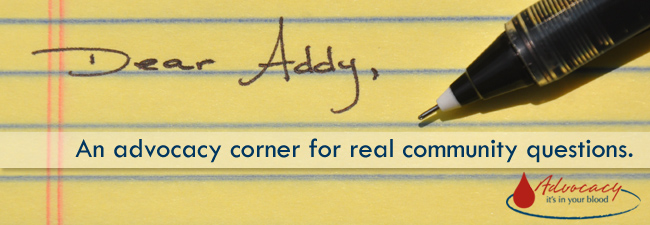
Dear Addy,
I rarely attend bleeding disorder related events because I want to protect my privacy. When I do attend it seems like every time I turn around people try to get me to complete a survey. Why is that? How can I protect my privacy?
~Under the Radar
_______________________
Dear UR,
Some companies, organizations, and medical providers collect information from the bleeding disorders community for legitimate reasons. There are surveys out there that offer community members an opportunity to have their voices heard, like HFA’s CHOICE Project. However, there are others that collect your information to market a product to you or perhaps use your responses for purposes that they don’t disclose.
No matter what the reason for the survey or who is giving it, it is important to protect your personal information at all times. The group giving the survey should inform you in advance of who will control the survey data, what it will be used for, and with whom it will be shared in its raw and aggregated forms. If you choose to take a survey, be careful about:
(1) giving out personally identifiable information, like your name, address, social security number, etc
(2) making any statements in your responses that you wouldn’t want to appear on the front page of a newspaper
(3) answering any questions that make you feel uncomfortable in anyway
Ultimately, it is your responsibility to protect your privacy. So if you don’t want to, don’t participate in surveys. The choice is yours.
Sincerely,
~Addy
Have a question? Click HERE. Your name will be changed in the response.Â
________________________________
HFA frequently receives questions from the bleeding disorders community related to advocacy issues. The questions often impact the entire community. In an effort to reach the largest audience possible with our responses to these widely applicable questions, HFA developed “Dear Addy.” Questions submitted to this column are edited in order to protect privacy and should be considered educational only, not individual guidance.



